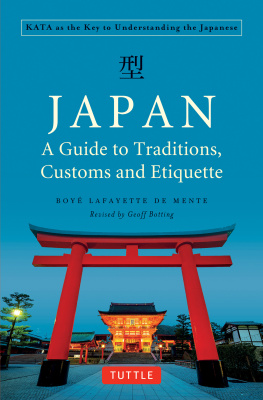INSTITUTIONS,
MANNERS, AND CUSTOMS
OF
THE JAPANESE.

CHAPTER I.
BAY OF NAGASAKI.
Intercourse of the Dutch with Japan.Voyage.Shipwrecked Japanese.Illegality and Danger of quitting their sinking Vessel.Approach to Kiusiu.Appearance of the Country.Bay of Nagasaki.Japanese Precautions prior to a Ship's entering the Bayand on Shore.Smuggling.Exclusion of a President's Wife.Reasons.Personal Appearance of the Japanese.Dress.Ensigns of Rank.Uses of the Fan.
H OLLAND has no direct communication with Japan. The factory at Dezima is under the control of the governor-general of the Dutch East Indian possessions; and it is with the seat of colonial government, Batavia, in the island of Java, that all its intercourse is carried on. Instructions and appointments originate there; and thence the two annual ships, to which the Dutch trade with Japan is limited, sail for the Bay of Nagasaki.
The voyage ordinarily occupies from five to six weeks, varying in length, however, according to the time. spent in visiting the Dutch settlements on the way. As it draws to a close, the stranger begins to be made acquainted with the peculiarities, physical and moral, of the unknown country to which he is bound. The first aspect of both is unprepossessing. The rocks and reefs that render so large a part of the coast inaccessible, and the frequent fogs that obscure, and storms that sweep the neighbouring seas, making the navigation hazardous even to the experienced mariner, are hardly more inhospitable than the offensive precautionary regulations to which the ship, and every individual on board, are subjected, before permission to anchor can be obtained. Occasionally, however, the unfitness of the native vessels to contend with the tempests in these seas, affords adventures anterior to these annoyances, which, by stimulating his curiosity, may induce the visiter to submit to them more patiently. Dr. Von Siebold had such an opportunity of making himself acquainted with the Japanese before arriving in their country, and learning something of the rigorous laws by which they are governed. He thus relates the occurrence:
"After a fearful storm, a wreck was discovered on the 5th of August, at daybreak. We made towards it, and recognised it to be a vessel without masts or sails, dragging two anchors. At first we thought her a Chinese junk; but from a distress-flag which she had hoisted, we soon ascertained that she was Japanese. Unable to carry the smallest sail, she was driving before the E.N.E. wind farther and farther from land. We lay to; and, stiff as was the gale, and high as was the sea, lowered a boat to offer our assistance to the unfortunate crew in their desperate situation. Capt. Jacometti himself went in the boat, and, by strenuous exertion, succeeded in reaching the wreck. The Japanese received the well-known Hollanders as their deliverers; and seeing the impossibility of making the land in their dismasted, leaky vessel, resolved to abandon her for our ship. It would seem, under such circumstances, that no great deliberation as to embracing the means of escape tendered could be requisite; but when we become better acquainted with the character of the Japanese, with their laws, and the responsibility weighing upon their officers and constituted authorities, we shall rather wonder that any degree of danger could induce a Japanese sailor to quit his own vessel to seek safety on board a foreigner. Meanwhile the Onderneming had rejoined us, and the gallant Captain Lelsz also hastened with his boat to the rescue. The Japanese sailors, twenty-four in number, were divided between the two boats. Some provisions, as rice, salt pork, sakee (a sort of beer or wine, made from rice, and the only fermented liquor known in Japan), tobacco, and also arms and clothes, were taken out, and the wreck was abandoned, after being scuttled at. the urgent prayer of her crew. Their crime would have been judged unpardonable had their deserted bark by any chance drifted to the Japanese coast: she must sink, in order to palliate in some measure the step which the unfortunate men had hazarded for their safety.
"In highly-excited expectation we watched our stout mariners as they battled with the mountainous billows. The boat was soon tossed to our side, and curiously did we gaze at the strange guests as they successively appeared on our deck. They greeted us courteously, but stood amazed; and, sailor-like, first admired the ship that had braved a storm so fatal to their own. They were the first Japanese we had seen, and greatly were we struck by their grave appearance and modest behaviour. Their dress, arms, implements, in short, all they brought on board, drew our attention, and we were presently engaged in pantomimic conversation with them. They were indeed tranquillized, and the unhoped-for change in their condition seemed gratifying to them; but the frightful images of past danger. and traces of long days of painful exertion, still spoke distinctly in their countenances. Their neglected dress and their whole carriage gave evidence of the state of despair whence they had escaped. They were, however, quickly reconciled to their lot, seemed to relish their sakee and tobacco, and chatted away with great animation. They spread their mats on deck; each one brought his box; and a scene, novel to us, began, namely, a Japanese toilet. Above all, we admired their dexterity in shaving their own heads. The Japanese shaves his beard and the crown of his head, omitting to do so only in misfortune, as in captivity, on the death of friends, and the like. In his appropriate coiffure, the newly-washed bristly hair left round the shaven crown gives him a wild aspect, which had here passed into the comic, every individual having cut off his queue as a sacrifice to his patron divinity, in acknowledgment of his deliverance from imminent danger-a Japanese seaman's ordinary vow. Cleanly dressed, they now walked the deck, and seemed transported to a new world. Every object awakened their curiosity and afforded matter for conversation."
The wreck proved to be a vessel belonging to the Prince of Satzuma, employed in the trade with the Loo-Choo Islands, dependancies of the Japanese empire, but more especially of his principality. And it may here be observed, that the danger of their deserted wreck's floating home was not the only one against which the Japanese mariners had to guard, in accepting the succour offered them. Had the Dutch been bound elsewhere than to Nagasaki, the involuntary absence thus occasioned could hardly have been so short as not to have subjected them to imprisonment, and a severe judicial examination, before they would be allowed to resume their station, low as it might be, among their countrymen; while anything of a distant voyage would have inevitably incurred the forfeiture of all their rights as natives of the empire.
The appearance of the country, on approaching the port, is very beautiful, and is thus described by Siebold:
"Hills clothed with green, and cultivated to the very summit, adorn the foreground, behind which arise blue mountain peaks in sharp outlines. Dark rocks here and there break the glassy surface of the sea, and the precipitous wall of the adjacent coast glittered with ever-changing hues in the bright beams of the morning sun. The mountain side of the nearest island, cultivated in terraces; tall cedars, among which white houses shone, and insulated temple-roofs jutted magnificently out, with numerous dwellings bordering the strand and the shores of the bay, afforded a truly pleasing sight. We did not neglect the opportunity of obtaining information from our Japanese guests, and learned with surprise that the pretty white houses, which we had taken for the mansions of grandees, were nothing more than storehouses, the walls of which are coated, as a precaution against fire, with mortar prepared from shell-chalk. Sailing vessels and fishing boats enlivened the mouth of the bay. At the call of our Japanese guests many fishermen approached, and offered us their fish with a liberality and civility quite astonishing in their rank of life. They were most friendly; and evidently took pleasure in presenting to us and to their rescued countrymen the fruits of their toil. Gold and gifts of value they refused, but begged some empty wine-bottles. Common green-glass bottles are much prized in Japan. These fishermen were as nearly naked as was at all compatible with decency."














